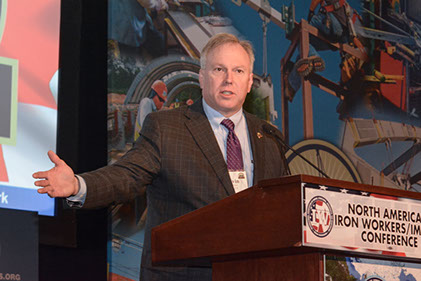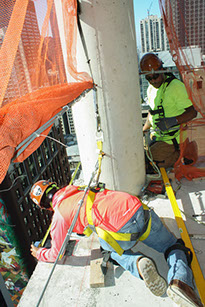
Opportunities for Ironworkers
ABOUT US |
Kevin Hilton is very passionate about social economic justice. As CEO of the Ironworkers Management Progressive Cooperative Trust (IMPACT), he fights for it every day through the group’s stance that everyone is entitled to a living wage, with benefits, that can support workers and their families.
It is something that is elusive in some industries, but Hilton believes that the more people know about being an ironworker, the more they’d be interested in pursuing it as a career. “Every ironworker that works with us starts with healthcare, earns a pension, and gets paid a middle class American wage,” says Hilton.
healthcare, earns a pension, and gets paid a middle class American wage,” says Hilton.
This son of the Midwest grew up in the Detroit area and graduated from the University of Michigan, later earning a graduate degree in Industrial Relations – the study of the relationship between employees and employers -- from the University of Wisconsin. Before arriving at IMPACT, Hilton was with the Teamsters, the National Maintenance Agreements Policy Committee, and The Association of Union Constructors (TAUC). Those positions allowed him to see the industries from both the employees’ and employers’ point of view, an experience he brings to IMPACT as he sings the praises of being an ironworker:
“It’s very rewarding to work more closely with the ironworkers union and their contractors, and when we can take people and provide them the opportunity to achieve the American Dream.”
It is very demanding work, Hilton adds, but also quite worthwhile and satisfying not only because you are able to see the fruits of your labor right in front of your eyes, but also since the pay is on average $35 an hour and can reach in some cases $100 an hour with wage, pension, annuity, and healthcare. The union is keen to reach the growing Latino population, and currently there are some 11,000 Hispanic ironworkers across the country.
“It is a tremendous opportunity for someone to engage in an occupation, and for many it becomes a vocation where they work closely with like-minded people,” Hilton tells LATINO Magazine. “Had I been in high school or college and someone said, ‘Hey do you want to make $25 an hour?’ I would have said where do I sign up? The career opportunity is enormous. The sky’s the limit.”
What exactly do ironworkers do? They install structural and reinforcing iron and steel to form and support  buildings, bridges, and roads, sometimes working at great heights to do so. Ironworkers start out as apprentices, and the training is stretched over three to four years, including on-the-job training and classroom sessions. Apprentices are paired with a variety of employers over the course of the program, and the union operates training centers all across the U.S. Industry partners include the American Institute of Architects, the Associated General Contractors of America, the International Association of Amusement Parks & Attractions, and the National Glass Association. An apprentice can also earn certification and college credits, and is trained how to work safely. After the apprentice program, the average starting salary is more than $50,000, not counting the opportunity to earn more through overtime. “Our model does not lend itself to low wages,” says Hilton.
buildings, bridges, and roads, sometimes working at great heights to do so. Ironworkers start out as apprentices, and the training is stretched over three to four years, including on-the-job training and classroom sessions. Apprentices are paired with a variety of employers over the course of the program, and the union operates training centers all across the U.S. Industry partners include the American Institute of Architects, the Associated General Contractors of America, the International Association of Amusement Parks & Attractions, and the National Glass Association. An apprentice can also earn certification and college credits, and is trained how to work safely. After the apprentice program, the average starting salary is more than $50,000, not counting the opportunity to earn more through overtime. “Our model does not lend itself to low wages,” says Hilton.
Once apprentices become journeymen, they continue training and earn continuing education credits and certificates while they work. The union also has an Ironworker Instructor Training program to ensure those doing the training are up to speed.
The employment outlook for the ironworker industry is quite bright. Department of Labor statistics project that overall employment of ironworkers is expected to grow 13 percent over the next several years, which is faster than the average for most occupations. High-rise building construction is expected to drive that growth, as well as the need to maintain and replace the country’s aging infrastructure of older roads and bridges. This will need the skills of welders, another part of the industry that experiencing growth. The ironworkers union has some 12,000 certified welders in the U.S.
Hilton, who speaks Spanish, stresses that the union is making a concerted effort to reach Latinas and other women, often using materials in Spanish. “Our makeup should reflect society,” says Hilton. “It’s no longer just for men.” For instance, the union recently introduced paid maternity leave so a women can go back to work after her baby is born, a benefit that was unheard of years ago.
Hilton stresses that the key to the country’s economic success now and into the future is not accomplished through low-skill, low-wage labor, and the ironworker industry is a great opportunity for young Latinos to consider: “We don’t train people for jobs, we train them for careers. This is a great opportunity for people to sustain themselves with a wage that allows them to provide for their family.”
Patricia Guadalupe